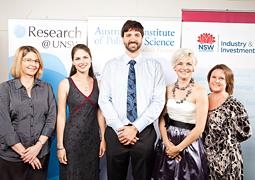Young Poppies stand tall
Discovering ways to prevent dementia has helped Dr Michael Valenzuela win a major science gong. He's one of seven UNSW researchers to be awarded Young Tall Poppy prizes - a record haul for any university.
Discovering ways to prevent dementia has helped Dr Michael Valenzuela win a major science gong. He's one of seven UNSW researchers to be awarded Young Tall Poppy prizes - a record haul for any university.

Discovering ways to prevent dementia has helped Dr Michael Valenzuela win a major science gong. He was one of seven UNSW researchers from medicine, science and engineering to be awarded Young Tall Poppy prizes - a record haul for any university in the awards' history.
Dr Valenzuela, a Research Fellow in the School of Psychiatry, shared the top prize of most outstanding scientist for NSW/ACT.
His work has shown that complex mental activity seems to protect the memory centre of the brain, the hippocampus, possibly reducing the likelihood of developing dementia and Alzheimer's later in life.
The Young Tall Poppy Science Awards, presented last night at the Powerhouse Museum, recognise the brightest early career researchers who have achieved significant scientific milestones in areas of most benefit to the community.
UNSW's winning researchers are making breakthroughs across a range of fields from climate change and heart disease to tissue engineering and ecological statistics.
From the Faculty of Science, Dr Marcus Cole (Chemistry) researches hydrogen storage methods for energy applications; Dr Donna Green (Climate Change Research Centre) is looking at climate change impacts on remote Indigenous communities in northern Australia; and Dr David Warton (Mathematics and Statistics) develops novel data analysis methods for understanding aspects of the biological world, including primate evolution and plant physiology.
From the Faculty of Engineering, Dr Penny Martens develops polymers (plastics) that can be used to replace worn out, or defective body parts; and Dr Matthew McCabe uses measurements from satellites and modeling techniques to describe Earth's hydrological cycle.
Joining Dr Valenzuela as a winner from the Faculty of Medicine is Dr Mary Kavurma, whose work is focused on understanding abnormal cell growth in arteries, a major factor in cardiovascular disease.
The Tall Poppy campaign is run nationally by the Australian Institute of Policy and Science. The program runs outreach activities in schools and the wider community to inspire young people about the possibilities of science.
Media contact: Denise Knight, UNSW Media Office | 9385 8920 | d.knight@unsw.edu.au